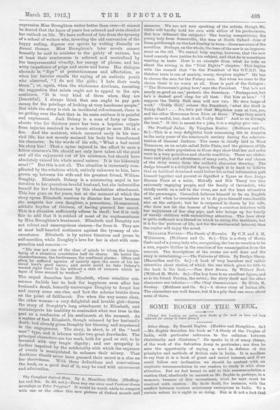The Compleat Oxford Man. By A. Hamilton Gibbs. (Skeffing- ton
and Son. Ss. 6d. net.)—Does any one ever read Verdant Green nowadays or Peter Prig gins ? It would be worth while to compare with one or the other this new picture of Oxford morals and manners. We are net now speaking of the artists, though Mr. Gibbs will hardly hold his own with either of his predecessors. But how different the subjects ! The boxing competitions, the young lady from Somerville, the teas at North Oxford—four of them got through on the last Sunday in term—those are some of the novelties. Perhaps, on the whole, the tone of the now is an improve- ment on the old. We cannot help saying, however, that the new hand scarcely does justice to his subject, and that he is sometimes wanting in taste. Hero is an example from what ho tells us about the rowing in the "Trial Eights" chapter. This begins with the remark that "to the President of the the October term is one of anxiety, worry, sleepless nights." He has to choose the men for the Putney race. But when we conic to the choice there is no worry at all. Here is part of the dialogue : "'The Houseman's going bow,' says the President. `But he's not nearly so good an oar,' protests the Secretary. 'Perhaps not, but he's a dashed good chap for all that. Put him at bow." I
suppose the Teddy Hall man will row two. Ho does heaps of work." Teddy Hall,' echoes the President, what the devil is Toddy I all? . . . No, let's put that Magdalen man at two, yes, and the other Houseman from Eton at throe. "'raps they aren't quite so useful, but, dash it all, Toddy Hall 1 ' And so on through the boat." If this is meant for a joke, it is a mighty poor one.






































 Previous page
Previous page